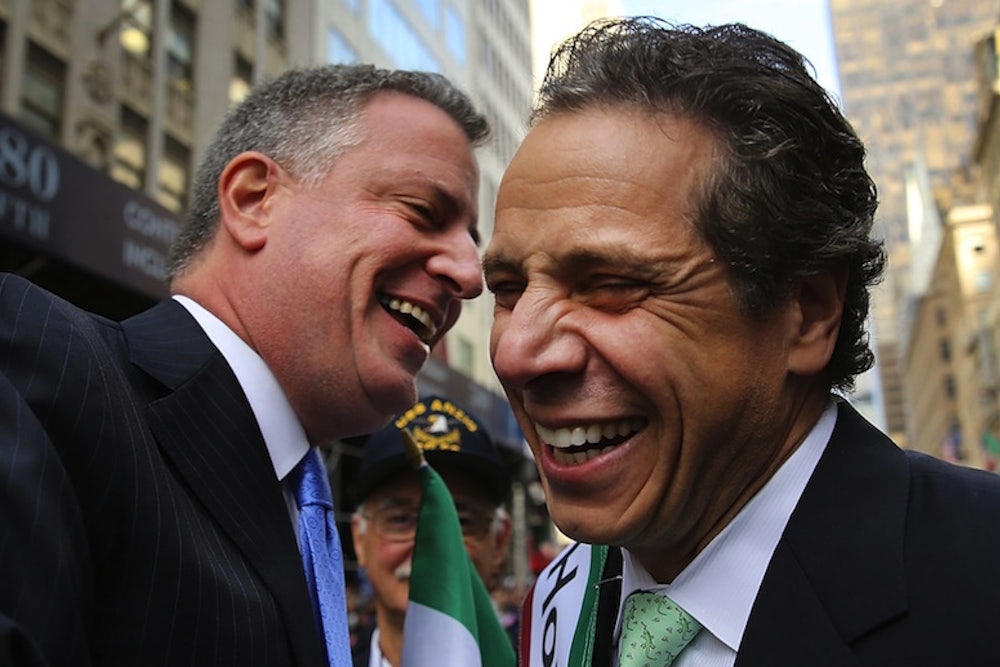New York Mayor Bill de Blasio may receive the kind of press attention most politicians would kill for, but on Monday he played the supplicant. He traveled to Albany, New York’s capital, to plead for the state government to pass a budget that would permit him to impose the tax plan that was the centerpiece of his campaign. His chief argument is that he needs the tax in order to raise enough money to pay for universal pre-kindergarten. His secondary argument is that he is not asking for a statewide tax, but merely a tax over the same voters who elected him with 73 percent of the vote not three months ago. These are both great arguments. But he is eliding another argument, one that jibes much more neatly with the themes he ran on last year.
De Blasio wants to raise by .5 percent the marginal income tax rate on New York City residents who make more than $500,000 a year in order to fund what would be, by the fall of 2015, universal pre-K for the city’s more than 73,000 eligible four-year-olds. He cannot do this without Albany’s approval. For reasons too byzantine and depressing to go into, that means he cannot do it without Democratic Governor Andrew Cuomo’s approval. (For the record, Assembly Speaker Sheldon Silver supports de Blasio’s plan.) Cuomo is up for re-election in November, and will almost certainly win, but as an aspiring national figure, he wants to win handily. He has been running on a plank of keeping taxes in line. Duly, he has opposed de Blasio’s plan, and has seemed to play a trump card by promising to fund universal pre-K (throughout the state, in fact) with existing funds. (De Blasio has known Cuomo for 20 years, having worked for him at the Department of Housing and Urban Development, and there is plenty of psychodrama there.)
De Blasio is right that making New York City subservient to Albany over its own policies is absurd. How absurd? If the city’s 73,000 four-year-olds picked up and formed their own city in Westchester County tomorrow, that would be the state’s eighth-largest city. As de Blasio more modestly put it Monday, “The city’s right to self-determination ought to be honored in Albany.”
De Blasio is also right that his way is a surer way of adequately funding pre-K. Cuomo’s initial offer—$1.5 billion statewide over five years, starting with $100 million in the first year—is dwarfed by de Blasio’s proposal of $340 million per year for New York City alone. Cuomo subsequently revised his offer to “whatever he needs,” which sounds about as reliable as it is specific. As de Blasio more politely put it Monday, his way would provide more “predictable and consistent” funding.
So de Blasio is making two good arguments. But here’s a third: His plan to tax New York’s richest in order to fund public education is an intrinsically good thing, even before you consider what exactly the new revenues would pay for. At base, it would transfer a small amount of wealth from a very small percentage of New York City’s residents to public schools—in theory, to all New York City residents, and for practical purposes a disproportionate number of the city’s lower- and middle-class residents. In other words, it would go a small way toward rectifying the massive inequality that was all de Blasio could talk about last year, and which he was elected by three-quarters of voters to address.
But de Blasio is not saying this. Instead, opponents of de Blasio’s plan, from conservatives to members of Cuomo’s camp, are the only ones talking about the tax beyond its funding for education. A New York Daily News editorial accused de Blasio of wanting the extra funds not to fund pre-K but in order to give more money to his union supporters, many of which have new contracts to negotiate with the city. The New York Post quotes a Cuomo loyalist making the exact same argument, which is certainly a pure coincidence. (In Albany Monday, de Blasio expressly denied this, insisting that the funds from the tax would be used solely for education programs.) The News’ Joshua Greenman acknowledged the tax’s ostensible fit with a broader progressive agenda, only to slam it down: “Whatever your thoughts on the economic justice motivation of raising a local tax on the wealthy,” he wrote, “it now looks like an exercise in progressivism for progressivism’s sake.”
But that’s just it. De Blasio’s thoughts on the economic justice of raising a local tax on the wealthy ought to be that doing so is a good thing. It isn’t progressivism for progressivism’s sake, it is progressivism for the sake of all the things that progressivism wants to do. Because of the state’s insane power over the city’s purse-strings, this isn’t quite a “if you can’t make it here, you can’t make it anywhere” situation. But de Blasio’s leverage right now consists largely in the mandate and media attention he brings. He may as well be true to himself and admit exactly why he wants this tax.
